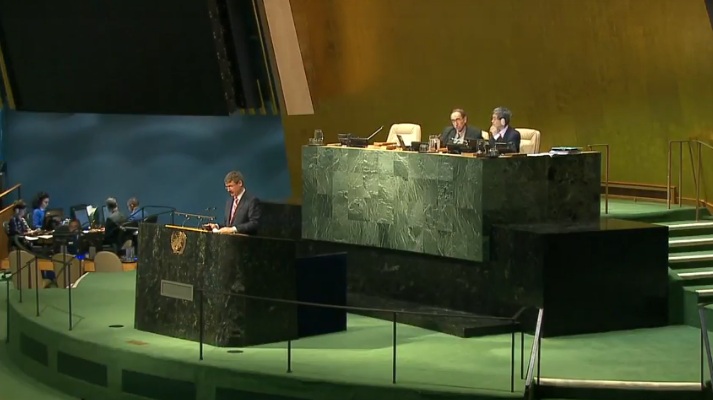Statement by Mr. Petr Iliichev, Chargé d'Affaires, at the 77th plenary meeting of the General Assembly on agenda items 29, 61 and 110 (Peacebuilding and sustaining peace)
We thank the President for convening today’s debate. We express our gratitude to the current and previous Chairs of the Peacebuilding Commission (PBC), Ambassador Cho Tae-yul and Ambassador Macharia Kamau, for their informative briefings and energetic efforts at the helm of the Commission.
United Nations peacebuilding support is an important tool to help States overcome the impact of conflict and prevent its recurrence. In that context, the Peacebuilding Commission plays an important role, as it is at the same time an intergovernmental consultative body on peacebuilding issues as well as a platform where its members can hear views from a broad range of invited participants regarding the issues on its agenda.
Last year was marked by a key event in the area of peacebuilding, namely, the adoption of identical resolutions by the Assembly and the Security Council on the peacebuilding architecture review (respectively, resolution 70/262 and resolution 2282 (2016)). We believe that the concrete long-term goals and objectives for peacebuilding and sustaining peace set out by the resolutions will make a positive contribution to efforts to provide peacebuilding support to countries that require such support.
The resolutions also brought the term “sustaining peace” into broader use. That term is inextricably linked to the goals and objectives of peacebuilding. It refers to the need to achieve lasting peace by eradicating the root causes of conflict through national reconciliation and, ultimately, through recovery, reconstruction and development. In working towards implementing these objectives, it is important to be fully aware that the responsibility for peace lies with all national stakeholders, the Government, society and the private sector. Only a comprehensive, unbiased approach to providing international assistance that takes into account country-specific contexts will contribute effectively in that area.
At the same time, the principle of national ownership should invariably remain at the heart of peacebuilding and sustaining peace. National ownership means that Governments, taking into account the needs of their people, find priorities and strategies for peacebuilding. It also means that the role of the United Nations and other international stakeholders in this process is that of providing support to countries, with their consent, when needed. Such support should be based on helping affected countries build capacity to overcome and prevent a recurrence of conflict.
It is important to be aware of, and never cross, the line where assistance ceases to be a stimulating factor and becomes imposed, essentially becoming interference in the internal affairs of States. That is unacceptable. Indeed, it is external interference in State affairs, including the replacement of legitimate regimes, that has caused numerous destructive conflicts. We emphasize that no peacebuilding efforts or innovative concepts will be useful as long as there is temptation to exert pressure and affect the internal processes in a sovereign country to serve the political aims of certain actors.
Last year was a very active one for the Commission and for the Peacebuilding Fund. They have once again shown the important role that they play in advancing and implementing peacebuilding objectives. That is also evidenced by the overall improvement of Fund programme results, as well as increased effectiveness in the implementation of its core projects. That was noted in the report (A/71/792) of the Secretary-General. It was also important that most of the projects sought to support national reconciliation, prevention and conflict resolution, and stimulate political dialogue.
We believe it is important to strengthen the interaction between the Commission and the Fund. The latter could benefit from the Commission’s vast experience as well as its contacts with partners who provide financial, technical and advisory support for post-conflict States. The Fund, in turn, has shown itself to be an excellent mechanism for financing peacebuilding efforts in affected countries, and one that helps to achieve recovery and development in these countries. We believe that last year’s review by the Commission of the results of the Fund’s work in Kyrgyzstan is a positive example of such interaction, with the consent and participation of the host State.
We believe it is important to further strengthen the cooperation of the Commission and the Fund with regional and subregional bodies, for example the African Union and the Economic Community of West African States. In order to effectively overcome crises on the African continent, we need an approach that is based on the leadership role of Africans themselves. They should be the ones to define how to settle whatever disputes may exist, and then receive effective support from the international community.
It is also important to increase the consultative role that the PBC plays. An important step in that area could be the sharing views of host countries on their peacebuilding priorities, as well as concerns. Such interaction is especially relevant at the stage when mandates are handed over from peacekeeping operations to country teams, and when United Nations peacekeeping missions are drawing down.
In terms of the importance of financing peacebuilding projects, we believe that this is directly affected by transparency and accountability in the use of funds. We trust that the Secretary-General, in his upcoming report, will present Member States with detailed and realistic options. In our view, those options can include enhancing the Fund tool kit, as well as increasing its attractiveness to potential donors.
